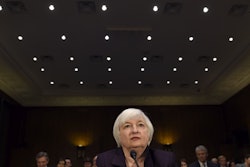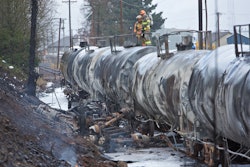

NEW DELHI (AP) — As the world celebrates reaching an unprecedented global climate treaty, India is praising nations' willingness to compromise for the good of the planet. But many in the country — which had been among the most strident during the negotiations — worry they had to compromise the most.
In the hours after the treaty was finalized in Paris, India's environment minister gave a speech that verged toward complaint, saying that the "actions of developed countries are far below their historical responsibilities and fair share."
"While give-and-take is normal in negotiations, we are of the opinion that the agreement could have been more ambitious," Prakash Javadekar said.
India's goals going into the talks were high. It wanted long-polluting rich nations to make the steepest cuts in climate-warming greenhouse gases, so others like India could continue to expand their economies on fossil fuels. It wanted considerable finance and free access to new technologies to expand its renewable energy capacity and cope with the effects of climate change.
And it wanted the final Paris climate treaty to enshrine the idea that industrialized nations, which have been emitting greenhouse gases for decades, are historically responsible for the climate crisis.
It was disappointed to some degree on all fronts. While the treaty does make distinctions between rich and poor nations in terms of various actions they should take, it ignores the concept of "historical responsibility" for climate change; it denies free access to new energy technologies; and it leaves open the possibility of developing countries still having to make emissions cuts of their own.
"The draft agreement further weakens differentiation between developed and developing countries like India," said Prodipto Ghosh, a former climate negotiator with a Delhi-based research group, The Energy and Resources Institute. "The absence of any target for financial resources to developing countries is disappointing."
At the same time, India was determined to avoid being labeled a spoiler in the talks — something it has been called in the past when it stood staunch on having its demands met.
Prime Minister Narendra Modi described the Paris treaty as equitable, saying in a Twitter message Sunday that it "has no winners or losers. Climate justice has won, and we are all working toward a greener future."
Experts and analysts are still coming to terms with what the deal might mean for India's development path. Some said the treaty's very existence was a plus for India, as the South Asian nation of 1.25 billion people will need global help with its development goals, and will continue to press the industrialized world for more action.
"As a vulnerable country, achieving a climate deal was important for India," added Navroz K. Dubash, coordinator of climate work at an independent New Delhi think tank, the Centre for Policy Research. "While India should certainly do its part, it is important that these mechanisms keep pressure on developed countries for more ambitious actions, to allow countries like India the carbon space to meet our development needs."
But what is becoming clear is that India could still soon face enormous pressure to do much more.
The 32-page agreement, endorsed by 195 countries, will be implemented only from 2020 — opening a window for India to update its pledges between now and then. Experts say much stronger commitments are still needed to meet the treaty's goal of limiting the average global rise in temperatures to "well below" 2 degrees Celsius from pre-industrial levels. Already, the world has warmed by 0.7 degrees Celsius. India had wanted the target limit set at 2 degrees, and argued unsuccessfully against those who wanted to set it lower.
"India believes that it will not have to do much before 2030," said the New Delhi-based Center for Science and Environment. But "India will be under constant pressure to take more burden for mitigating climate change by 2020 and beyond."
That's largely due to the fact that India — the world's third-largest carbon emitter among nations — has no plans to curb its coal use any time soon. While both the U.S. and China have leveled their coal use in the last few years, India has committed to tripling its coal-fired electricity capacity to 450 gigawatts by 2030.
India, along with many analysts, argues that the country has little choice in the short term, unless it leaves its masses mired in poverty. There are still some 300 million Indians — a quarter of the population — with no electricity at all, while a vast amount of infrastructure is yet to be built.
To allay fears that India intended to pollute without end, the country's top negotiators in Paris underlined plans for a five-fold boost in renewable energy and a firm intention to phase out all coal plants using old, inefficient technology.
Pollution pledges aside, Indian analysts said the Paris treaty confirms India's belief that protecting the climate must be part of an overall plan that also includes developing economically and alleviating poverty.
"Developed countries are expected to take the lead on mitigation and support, while developing countries are expected to take actions within the context of their sustainable development and poverty eradication imperatives," said Lavanya Rajamani with the Centre for Policy Research. "As a large developing country with little historic responsibility for the problem and considerable energy needs, this was an important outcome for India."
___
Athar Parvaiz contributed to this report from Paris.
___
Follow Katy Daigle: http://twitter.com/katydaigle






















